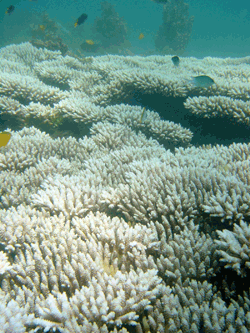HighlandReefer
Team RC
Outlook "poor" for Great Barrier Reef: study By Rob Taylor Rob Taylor "“ Wed Sep 2, 1:22 am ET
CANBERRA (Reuters) "“ Australia's Great Barrier Reef, the world's largest living organism, is under grave threat from climate warming and coastal development, and its prospects of survival are "poor," a major new report found on Wednesday.
While the World Heritage-protected site, which sprawls for more than 345,000 square km (133,000 sq miles) off Australia's east coast, is in a better position than most other reefs globally, the risk of its destruction was mounting.
"Even with the recent management initiatives to improve resilience, the overall outlook for the Great Barrier Reef is poor and catastrophic damage to the ecosystem may not be averted," a government reef management body said in the report.
The five-yearly reef outlook report, aimed at benchmarking the health of the reef, found climate change, declining water quality from coastal runoff, development and illegal fishing were the biggest dangers to the reef.
The study echoed findings by scientists belonging to the U.N. Intergovernmental Panel on Climate Change that the Great Barrier Reef could be "functionally extinct" within decades, with deadly coral bleaching likely to be an annual occurrence by 2030.
The reef was one of the most diverse and remarkable ecosystems in the world, and populations of almost all marine species were still large, the government's Great Barrier Reef Marine Park Authority said in the report.
But some ecologically important species, such as dugongs, marine turtles, seabirds, black teatfish and some sharks had declined significantly, while coral diseases and pest outbreaks like crown-of-thorns starfish appeared to be increasing and becoming more serious.
CHALLENGE AHEAD
A separate report by the Australian Institute of Marine Science, also released on Wednesday, found ocean temperatures on northern parts of the reef had been a degree above average through winter, pointing to a bad year for coral bleaching.
"We know that a failure to act on dangerous climate change puts at risk significant places like the Great Barrier Reef and this report confirms the scale of the challenge ahead," Australia's Environment Minister Peter Garrett said.
Bleaching occurs when the tiny plant-like coral organisms die, often because of higher temperatures, and leave behind only a white limestone reef skeleton.
Garrett and Queensland state Premier Anna Bligh unveiled a plan to improve water quality on the reef. It followed a report last year which found agricultural run-off was killing the reef, with some sections already irreversibly damaged.
The plan aimed to halve the runoff of harmful nutrients and pesticides by 2013 and ensure 80 percent of agricultural enterprises and 50 percent of grazing operations were taking steps to reduce runoff.
The World Wide Fund for Nature (WWF) said the report added urgency to a debate in Australia's parliament on laws to curb carbon emissions, rejected last month by the upper house Senate and due for a second vote in mid-November.
"We cannot sit back and let the world's largest and most iconic reef system die on our watch," said WWF reef campaigner Nick Heath.
(Editing by Robert Birsel)
CANBERRA (Reuters) "“ Australia's Great Barrier Reef, the world's largest living organism, is under grave threat from climate warming and coastal development, and its prospects of survival are "poor," a major new report found on Wednesday.
While the World Heritage-protected site, which sprawls for more than 345,000 square km (133,000 sq miles) off Australia's east coast, is in a better position than most other reefs globally, the risk of its destruction was mounting.
"Even with the recent management initiatives to improve resilience, the overall outlook for the Great Barrier Reef is poor and catastrophic damage to the ecosystem may not be averted," a government reef management body said in the report.
The five-yearly reef outlook report, aimed at benchmarking the health of the reef, found climate change, declining water quality from coastal runoff, development and illegal fishing were the biggest dangers to the reef.
The study echoed findings by scientists belonging to the U.N. Intergovernmental Panel on Climate Change that the Great Barrier Reef could be "functionally extinct" within decades, with deadly coral bleaching likely to be an annual occurrence by 2030.
The reef was one of the most diverse and remarkable ecosystems in the world, and populations of almost all marine species were still large, the government's Great Barrier Reef Marine Park Authority said in the report.
But some ecologically important species, such as dugongs, marine turtles, seabirds, black teatfish and some sharks had declined significantly, while coral diseases and pest outbreaks like crown-of-thorns starfish appeared to be increasing and becoming more serious.
CHALLENGE AHEAD
A separate report by the Australian Institute of Marine Science, also released on Wednesday, found ocean temperatures on northern parts of the reef had been a degree above average through winter, pointing to a bad year for coral bleaching.
"We know that a failure to act on dangerous climate change puts at risk significant places like the Great Barrier Reef and this report confirms the scale of the challenge ahead," Australia's Environment Minister Peter Garrett said.
Bleaching occurs when the tiny plant-like coral organisms die, often because of higher temperatures, and leave behind only a white limestone reef skeleton.
Garrett and Queensland state Premier Anna Bligh unveiled a plan to improve water quality on the reef. It followed a report last year which found agricultural run-off was killing the reef, with some sections already irreversibly damaged.
The plan aimed to halve the runoff of harmful nutrients and pesticides by 2013 and ensure 80 percent of agricultural enterprises and 50 percent of grazing operations were taking steps to reduce runoff.
The World Wide Fund for Nature (WWF) said the report added urgency to a debate in Australia's parliament on laws to curb carbon emissions, rejected last month by the upper house Senate and due for a second vote in mid-November.
"We cannot sit back and let the world's largest and most iconic reef system die on our watch," said WWF reef campaigner Nick Heath.
(Editing by Robert Birsel)






